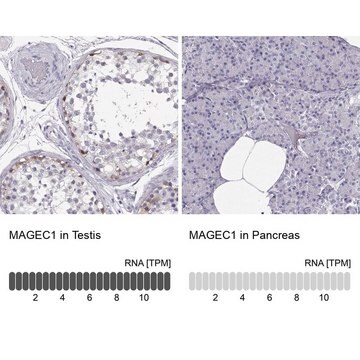M7820
Anti-MAGE-C1 antibody, Mouse monoclonal
clone CT7-33, purified from hybridoma cell culture
Sinônimo(s):
Anti-CT7
About This Item
Produtos recomendados
fonte biológica
mouse
conjugado
unconjugated
forma do anticorpo
purified immunoglobulin
tipo de produto de anticorpo
primary antibodies
clone
CT7-33, monoclonal
forma
buffered aqueous solution
peso molecular
antigen ~180 kDa
reatividade de espécies
human
concentração
~1 mg/mL
técnica(s)
immunocytochemistry: suitable
immunohistochemistry: suitable
immunoprecipitation (IP): suitable
indirect ELISA: suitable
western blot: 1-2 μg/mL using total cell extract of SKML37 cells
Isotipo
IgG1
nº de adesão UniProt
Condições de expedição
dry ice
temperatura de armazenamento
−20°C
modificação pós-traducional do alvo
unmodified
Informações sobre genes
human ... MAGEC1(9947)
Descrição geral
Imunogênio
Aplicação
- Anti-MAGE-C1 antibody, Mouse monoclonal has been used in:
- enzyme-linked immunosorbent assay (ELISA)
- immunocytochemistry
- immunoblotting
- immunoprecipitation
- immunohistochemistry
Ações bioquímicas/fisiológicas
Descrição-alvo
forma física
Exoneração de responsabilidade
Não está encontrando o produto certo?
Experimente o nosso Ferramenta de seleção de produtos.
Código de classe de armazenamento
10 - Combustible liquids
Classe de risco de água (WGK)
WGK 3
Ponto de fulgor (°F)
Not applicable
Ponto de fulgor (°C)
Not applicable
Equipamento de proteção individual
Eyeshields, Gloves, multi-purpose combination respirator cartridge (US)
Certificados de análise (COA)
Busque Certificados de análise (COA) digitando o Número do Lote do produto. Os números de lote e remessa podem ser encontrados no rótulo de um produto após a palavra “Lot” ou “Batch”.
Já possui este produto?
Encontre a documentação dos produtos que você adquiriu recentemente na biblioteca de documentos.
Nossa equipe de cientistas tem experiência em todas as áreas de pesquisa, incluindo Life Sciences, ciência de materiais, síntese química, cromatografia, química analítica e muitas outras.
Entre em contato com a assistência técnica







